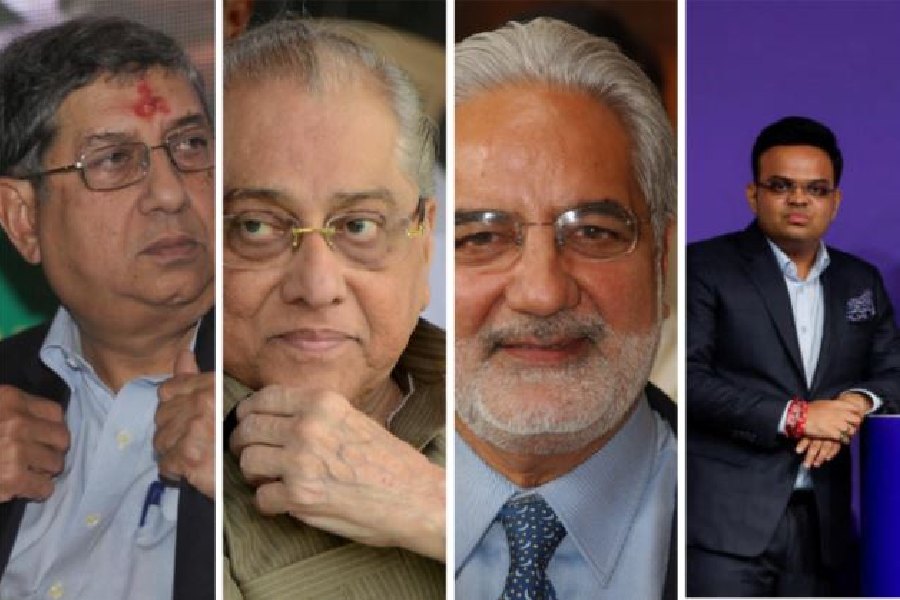During his early days as BCCI secretary, Jay Shah would plead fervently to his fellow office-bearers to ensure that the high-profile matches were allotted to Ahmedabad.
The refurbished Motera stadium with more than a lakh of seating capacity was almost ready in February 2020 and Shah was hell-bent on bringing big-ticket encounters to Ahmedabad. What began as a joke in some circles whenever an IPL final or an important Test was around has turned into a norm since the time the Gujarat Cricket Association strongman settled into his BCCI role for a second term.
IPL finals at the Motera stadium are now considered an annual affair much like the Melbourne Cricket Ground hosting the Boxing Day Test. It is also an indication of the changing power equations within the Board.
It was no surprise then that the world’s biggest cricket stadium would host the World Cup final on November 19 besides also the inaugural match on October 5, and the high-voltage India-Pakistan league clash on October 15.
The days of Eden Gardens or Mumbai’s Wankhede stadium hosting prime matches are a thing of the past and Ahmedabad’s taking over that pedigreed status is a reflection of the shift in cricket’s centre of power.
That Shah has emerged as the most influential man in not just at the BCCI, but also the International Cricket Council (ICC), has helped Ahmedabad’s cause.
However, Indian cricket is replete with such instances and it would be unfair to blame Shah for exercising such clout.
Much before Ahmedabad enjoyed the status of the new cricket capital of the country, Calcutta had the same privilege during the days of Jagmohan Dalmiya. Even Mumbai had such No.1 ranking when Sharad Pawar was at the BCCI’s helm while Chennai too called the shots during N. Srinivasan’s heydays.
When India last hosted the 50-over World Cup in 2011, Shashank Manohar was the president but Pawar, then the ICC chairman, still enjoyed enough clout to persuade the Board to allot the final to the Wankhede. Pawar too used his influence when the Brabourne stadium hosted the 2006 Champions Trophy final.
Dalmiya along with his ‘guru’ Biswanath Dutt used similar tactics to bring the 1987 World Cup final and 1996 World Cup semi-final to Eden. Not many cricket stadiums were available which met international standards then, and none could question Dalmiya or Pawar’s intentions.
Since India’s emergence as an economic powerhouse in world cricket and BCCI’s stress on infrastructure, there has been a spurt in state-of-the-art stadiums. The choice of World Cup venues has naturally raised several questions with the BCCI doing what it does best — maintain silence without citing any reasons.
That established Test centres like Mohali, Nagpur, Rajkot and Ranchi have been ignored at the cost of Pune and Dharamsala has led to talks about political interference and personal choices. Voices of dissent are growing though none would want to go on record for fear of backlash.
Mohali, which hosted the India-Pakistan semi-final in 2011, has been the biggest loser. The Prime Ministers of both countries were witness to that iconic clash. Once considered the best venue in India for its hospitality, Mohali’s stock has taken a nosedive since the retirement of its former chief Inderjit Singh Bindra.
A former Board chief, Bindra played a huge role in Dalmiya’s ascendancy to the ICC and bringing the World Cup to the subcontinent in 1996. Mohali hosted a semi-final in that edition and has since never missed out on ICC tournaments.
Punjab sports minister Gurmeet Singh has vowed to take it up with the Board. Of late, Mohali has had issues with media facilities but that hasn’t been so bad to deny the venue a World Cup ticket. Perhaps they no more enjoy the confidence of the powers-that-be in the Board with the advent of Dharamsala.
“Mullanpur Stadium is getting ready in Mohali. Had it been ready, they would have got a World Cup match. The current stadium in Mohali did not meet the standards of ICC,” reasoned vice-president Rajeev Shukla on Wednesday.
None of the officials The Telegraph spoke to said that the BCCI had alerted them that they would be deprived of World Cup matches. An association secretary was even assured by a top-ranked Board official during the IPL final that he would personally be present to watch the World Cup. The snub has really come as a rude shock.
“There is nothing we can do about it... Just accept and move forward. We will have to look forward to the bilateral matches and hope for the best,” said Jaydev Shah, president of the Saurashtra Cricket Association, which controls Rajkot stadium.
But not all associations are willing to take it so sportingly. They feel they have been victimised and let down for their political allegiance. How Shah manages to tame the dissenting voices will go a long way in proving his administrative skills in the coming days.











